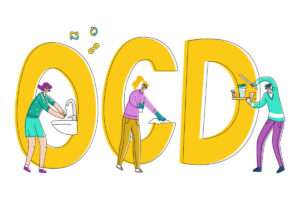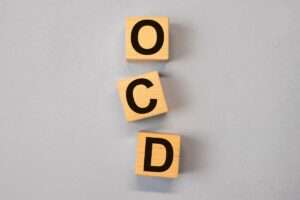Serotonin and OCD share a significant relationship that sheds light on how brain chemistry impacts mental health. Obsessive-Compulsive Disorder (OCD) is a complex mental health condition characterized by intrusive thoughts (obsessions) and repetitive behaviors (compulsions). Serotonin, often called the “feel-good chemical,” plays a crucial role in mood regulation, anxiety management, and cognitive functions. This article explores five ways serotonin influences OCD and offers insights into supporting serotonin levels naturally.
What is Serotonin?
Serotonin is a neurotransmitter that acts as a chemical messenger in the brain and nervous system. It regulates mood, sleep, and appetite while influencing brain circuits involved in anxiety and decision-making. In the context of serotonin and OCD, imbalances in this neurotransmitter are closely linked to the symptoms and behaviors associated with the condition.

For Best OCD Treatment in Delhi consider visiting:
How Serotonin Impacts OCD
1. Regulation of Brain Activity
One of the most important connections between serotonin and OCD is its role in regulating brain circuits. Research indicates that individuals with OCD often exhibit imbalances in serotonin, especially in areas like the orbitofrontal cortex and basal ganglia. These regions control decision-making and emotional regulation, which are frequently disrupted in OCD.
2. Connection to Anxiety and Mood
Heightened anxiety and mood disturbances are common in OCD. Serotonin plays a vital role in managing these factors by acting on receptors in the brain. When serotonin levels are low, obsessive thoughts and compulsive behaviors can intensify, creating a challenging cycle for those with OCD.
3. Influence on Neuroplasticity
The relationship between serotonin and OCD extends to neuroplasticity — the brain’s ability to adapt and form new connections. Serotonin facilitates this adaptability, helping the brain develop healthier patterns to manage OCD symptoms. This is why serotonin modulation is often explored in therapeutic approaches.

4. Role in Impulse Control
Difficulty in controlling impulses is a hallmark of OCD. Serotonin interacts with the brain’s inhibitory pathways, helping regulate impulsive behaviors. When serotonin levels are imbalanced, individuals may struggle to resist compulsive urges, exacerbating OCD symptoms.
5. Impact on Cognitive Processing
Cognitive processing, such as decision-making and memory, is influenced by serotonin. For individuals with OCD, this neurotransmitter helps reduce excessive rumination and doubt, which are common challenges. Optimizing serotonin levels can streamline these processes and ease the burden of intrusive thoughts.
The Science Behind Serotonin and OCD
Scientific studies underline the connection between serotonin and OCD. According to the National Institute of Mental Health (NIMH), serotonin influences anxiety disorders, including OCD. Researchers are delving deeper into how serotonin interacts with other brain chemicals to uncover innovative treatments for this condition.
How to Support Serotonin Levels Naturally
While professional help is essential, certain lifestyle choices can support serotonin levels and improve OCD symptoms:
1. Regular Physical Activity
Exercise boosts serotonin production in the brain. Activities like walking, yoga, or swimming enhance mood, reduce anxiety, and help manage OCD symptoms.
2. Balanced Diet
Foods rich in tryptophan, an amino acid that aids serotonin synthesis, can naturally support serotonin levels. Include nuts, seeds, and leafy greens in your diet.
3. Adequate Sunlight Exposure
Sunlight plays a key role in serotonin production. Spending time outdoors, especially in the morning, can regulate serotonin and uplift mood.
4. Mindfulness and Relaxation Techniques
Meditation, deep breathing, and other relaxation techniques reduce stress and indirectly support serotonin balance.
5. Social Connections
Positive social interactions stimulate serotonin release. Building strong relationships can significantly improve mental well-being.
Seeking Help for OCD
Managing OCD requires a comprehensive approach. If you’re struggling with OCD symptoms, seek support from licensed professionals and trusted organizations. Reputable resources such as the National Institute of Mental Health and the Centers for Disease Control and Prevention (CDC) provide valuable guidance for individuals and families.

Final Thoughts
The intricate relationship between serotonin and OCD highlights the importance of understanding brain chemistry in mental health. From regulating mood to improving cognitive functions, serotonin plays a vital role in managing OCD symptoms. With professional support and lifestyle adjustments, individuals with OCD can achieve better mental health outcomes.
Prioritizing awareness and education about serotonin and OCD ensures a brighter future for those navigating this condition. Together, we can support a more informed and compassionate approach to mental health challenges.